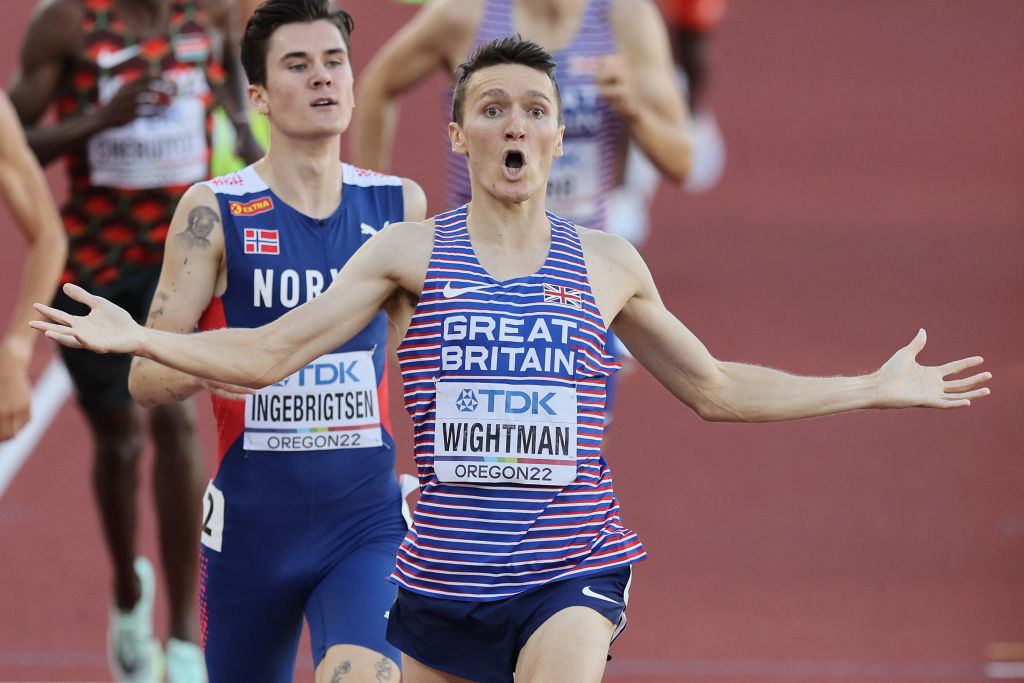Wightman the latest in a long line of British 1,500m successes

In the 1950s it was Roger Bannister in the 1,500m; in the 1980s it was Steve Ovett, Sebastian Coe and Steve Cram dominating the global landscape of middle-distance track and field athletics.
And this week, in 2022, it’s Jake Wightman, the 28-year-old three-and-three-quarters lap runner who secured gold at the World Athletics Championships in Oregon.
It was a family affair, too, for the Brit; his mother was in the stands, his father in the gantry as stadium announcer – how he remained cool, calm and collected remains unknown.
Because Geoff’s son was competing against Olympic champion Jakob Ingebrigtsen, Tokyo 2020 silver medalist Abel Kipsang with his notorious kick, and Timothy Cheruiyot, among others.
But as the Nottingham-born Wightman got onto the shoulder of the seemingly unbeatable Norwegian with just 200m to go, fellow TeamGB athletes knew what was on the cards.
“Oh my God, oh my God, oh my God,” sprinter Asha Philip pronounced as she watched from the team’s base in Eugene, in the States’ north west.
Wightman on the shoulder
Everyone sensed exactly what Wightman was doing: sticking on the shoulder of the favourite and, ultimately, taking a risk.
The risk was calculated to perfection. Wightman kicked with 150m remaining, and again with 75m to go as he secured the 1,500m title in a world lead time of 3:28.23 – a yard or two ahead of Ingebrigtsen’s season’s best performance.
A first major British middle-distance men’s medal since Coe in 1984, a first at the athletics championships since Cram in 1983 – and the latest chapter in Britain’s storied history of 1,500m running.
Wightman’s historic achievement follows the monumental effort by Laura Muir to secure a bronze just days ago in the same event.
Having fought for a silver at the Tokyo Olympics last year, a bronze in America will suffice for the Scottish athlete following a blistering opening start to her race.
Wightman, fellow Briton Josh Kerr – who finished fifth ahead of Kipsang and Cheruiyot – Kelly Holmes, Jo Pavey, Ovett, Coe and Cram – to name a few – have graced the polyurethane coated athletics tracks of years past.
The middle-distance events have been an ever-present in British track, defining the rivalries that have shaped the way many see the sport.
Coe is now head of World Athletics, Cram now a commentator, but athletics archives of old will relay footage of Coe versus Cram – no matter their position in a group of any size, it was always just portrayed as Cram versus Coe – that was the battle.
The 1,500m probably draws us in partly to do with its contextual distance – Brits the country over know the 1.5km distance, or just short of a mile – but the battles that have raged throughout British track history in the middle distance discipline helps it maintain its aura.
It could all be coincidence, it could be a funding reward for a strong British 1,500m performance in Japan – but it’s worked anyhow.
Think of Holmes’s heroics in Athens, the trio of men in the 1980s and, now, Wightman in 2022 – the youngster from England has received the baton of British middle distance history and can now run away with it.
But if history is anything to go by, there will be another athlete – here in the present or somewhere in the future – who is ready to take that legacy and add their own chapter to a book of British athletics history that this week gained another page courtesy of world champion Jake Wightman.